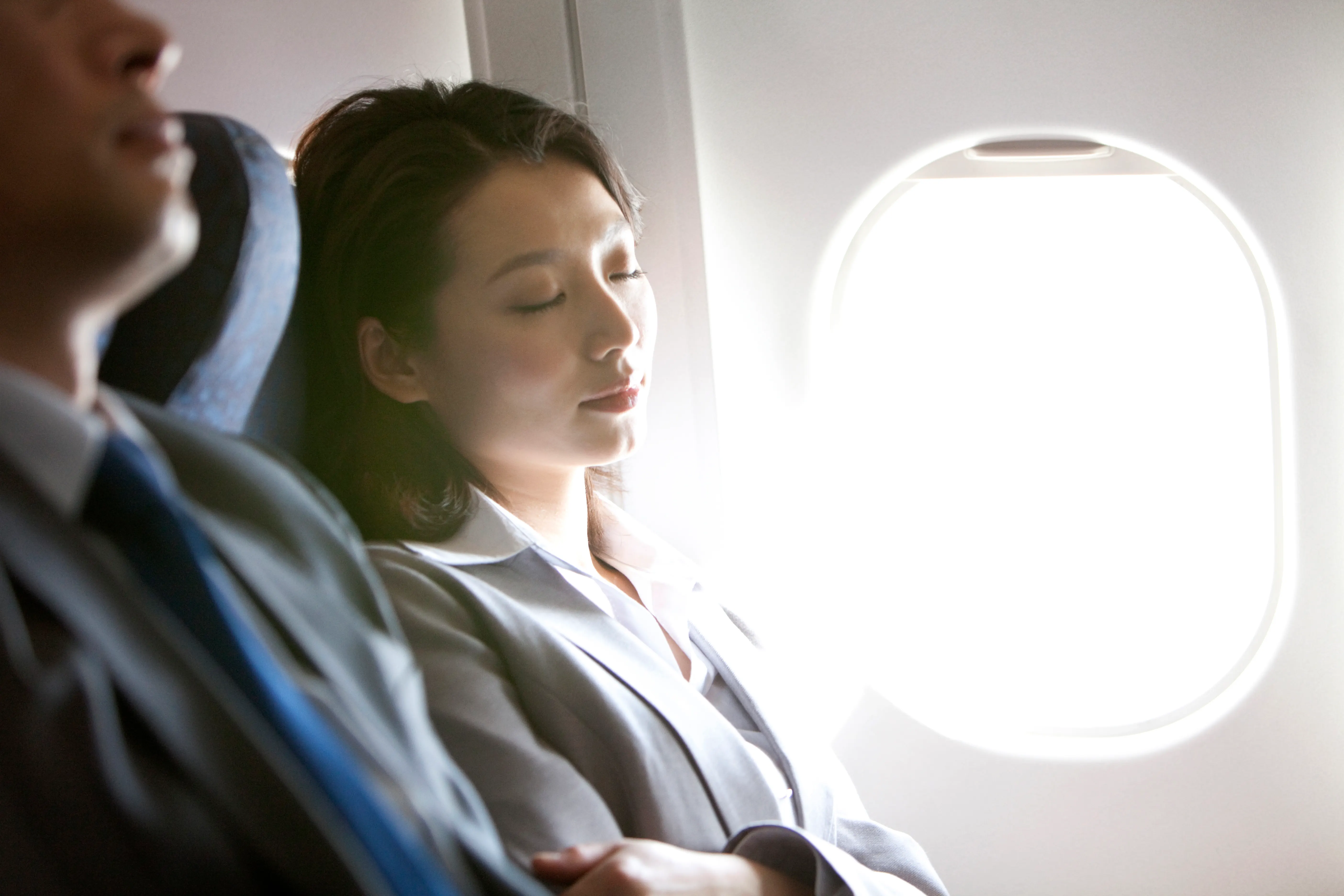Crossing time zones can get you to your dream destination, but it can also leave your body stuck in the past. Jet lag is that all-too-familiar exhaustion, brain fog, and restless sleep that hits after long flights.
Whether you're traveling for work or vacation, understanding how to recover from jet lag can significantly impact your mood and performance upon landing.
What Is Jet Lag?
Jet lag is a temporary condition that occurs when your body’s internal clock is out of sync with the local time at your travel destination. This usually happens after crossing multiple time zones quickly, such as during long-haul flights.
Your body is still operating on your original time zone’s schedule, which can cause sleep disturbances, fatigue, and difficulty concentrating. In short, jet lag is your body struggling to adjust to a new day-night cycle.
Why Jet Lag Happens
Jet lag occurs because your body’s natural rhythms get thrown off when you travel quickly across time zones. Below are several key factors that contribute to this disruption.
- Disruption in Your Body’s Circadian Rhythm: Your body follows a natural 24-hour cycle called the circadian rhythm, which tells you when to sleep, eat, and be active. Jet lag happens because crossing time zones suddenly confuses this internal clock, making it out of sync with the local time. This leads to feelings of tiredness when you should be awake and alertness when it’s time to sleep.
- Crossing Multiple Time Zones Quickly: When you travel fast across several time zones, your body doesn’t have enough time to adjust gradually. This sudden shift means your brain and body are still on “home time,” while the environment and schedule around you operate on a different clock.
- Lack of Exposure to Natural Light During Travel: Light is the main cue that helps reset your circadian rhythm. Spending long hours inside an airplane, often without exposure to sunlight, disrupts your body’s ability to adapt to the new time zone. Without the right light signals, your internal clock stays stuck on the old schedule longer.
Common Jet Lag Symptoms
The misalignment of your internal clock with the local time can cause a range of physical and mental symptoms. Here are some of the most common signs of jet lag.
- Fatigue and Daytime Sleepiness: You may feel overwhelmingly tired during the day, no matter how much you’ve slept. This is your body’s way of telling you it’s still on the old time zone.
- Trouble Falling or Staying Asleep: Jet lag often causes insomnia or restless sleep because your body’s internal clock and local nighttime don’t match.
- Digestive Problems or Nausea: Your digestive system can also get confused, leading to symptoms like upset stomach, constipation, or nausea.
- Difficulty Concentrating or Irritability: Mental fog, poor focus, and mood changes like irritability or mild depression are common as your brain adjusts to the new schedule.
How to Get Over Jet Lag

Adjusting to a new time zone after a long flight can be challenging, but with the right strategies, you can reduce the symptoms of jet lag and feel refreshed faster.
This section covers practical steps to help your body adapt smoothly and get the most out of your trip.
Gradually Adjust Your Sleep Schedule Before Traveling
Preparing your body ahead of time helps ease the transition to a new time zone. Start shifting your sleep and wake times closer to your destination’s schedule a few days before your trip.
- Shift Your Bedtime 1–2 Hours Closer to Your Destination's Time: Gradually go to bed earlier or later, depending on your travel direction.
- Eat and Wake Up at the Target Schedule a Few Days Early: Align your meals and wake times with your destination’s time to help your body adapt sooner.
Stay Hydrated Throughout Your Journey

Dehydration can worsen jet lag symptoms, so keeping your fluid intake up is essential during and after your flight.
- Drink Plenty of Water Before, During, and After Your Flight: Staying hydrated supports energy and helps reduce fatigue.
- Avoid Alcohol and Caffeine, Which Can Dehydrate You: Both alcohol and caffeine can disrupt sleep and increase dehydration.
Get Sunlight Exposure as Soon as You Arrive
Natural light is the strongest signal to your internal clock and helps reset your circadian rhythm.
- Spend Time Outside in Natural Daylight: Aim for morning sunlight if traveling east, or afternoon/evening light when traveling west.
- Use Sunlight to Help Reset Your Internal Body Clock: Light exposure helps your brain adjust to the new time zone faster.
Avoid Napping on Arrival (Unless Necessary)
Resisting naps helps your body sync with local time, but short naps can be useful if you're exhausted.
- Stay Awake Until Local Bedtime to Adjust Faster: Try to keep yourself awake until nighttime at your destination.
- Keep Naps Short (20–30 Minutes) if Needed: Avoid long naps that can disrupt nighttime sleep.
Eat According to the New Time Zone

Eating at regular local meal times helps signal your body about the new schedule.
- Align Meals With Local Breakfast, Lunch, and Dinner Times: Consistent meal timing reinforces your body’s new rhythm.
- Avoid Heavy Meals Close to Bedtime: Large meals late at night can interfere with sleep quality.
Move Around During the Flight
Physical activity during your flight improves circulation and can reduce stiffness and fatigue.
- Stretch or Walk Every Hour or Two on Long Flights: Simple movement helps prevent discomfort and sluggishness.
- Do Simple Exercises to Improve Circulation and Reduce Fatigue: Leg stretches, ankle circles, and shoulder rolls are good options.
Consider Using Melatonin Supplements
Melatonin can help signal your body to fall asleep at the appropriate local time.
- Helps Reset Your Sleep Cycle When Taken at the Right Time: Taking melatonin 30–60 minutes before your desired bedtime can promote sleep.
- Consult Your Doctor for Dosage and Timing: Always check with a healthcare professional before starting supplements.
Limit Screen Time Before Bed
Exposure to blue light from phones, tablets, and laptops can interfere with your body’s melatonin production.
- Blue Light From Devices Can Delay Melatonin Production: This makes falling asleep more difficult.
- Try Reading a Book or Listening to Calming Music Instead: These activities help you wind down naturally.
Use Melatonin Wisely
Melatonin helps control your sleep cycle. Taking supplements can reset your internal clock when timed right, usually 30 to 60 minutes before bedtime. Using melatonin incorrectly may confuse your body, so check with a doctor before starting.
Exercise (at the Right Time)
Exercise boosts energy and helps regulate sleep. Morning or early afternoon workouts reinforce your new time zone’s rhythm. Avoid intense exercise close to bedtime to prevent trouble falling asleep. Gentle stretches in the evening are better for winding down.
When Traveling East vs. West: What’s the Difference?
The direction you travel greatly affects how your body adjusts to a new time zone. Traveling east means losing time, while traveling west means gaining time, and each has unique challenges and strategies for coping with jet lag.
Traveling East (Losing Time)
Flying east shortens your day, making it harder to adjust because your body has less time to sync with the new schedule. To adapt, it’s best to gradually go to bed and wake up earlier in the days leading up to your trip. This helps your internal clock shift forward smoothly.
- Harder to Adjust Because Your Day Is Shorter: Your body needs to fall asleep earlier than usual, which can be difficult.
- Go to Bed Earlier and Wake Up Earlier Gradually: Slowly shift your sleep schedule by 1–2 hours before traveling.
Traveling West (Gaining Time)
Traveling west gives you a longer day, which is generally easier for your body to handle. You can stay awake later and gradually shift your schedule to later times to match the new time zone.
- Easier to Adapt as Your Day Is Longer: Staying up later aligns better with your natural circadian rhythm.
- Stay Up Later and Shift Your Schedule Later: Gradually delay your bedtime and wake-up time before traveling.
FAQs
How Long Does It Take to Get Over Jet Lag?
Generally, it takes about one day per time zone crossed to fully adjust. Some people recover faster, especially if they follow good jet lag strategies.
Can Melatonin Help With Jet Lag?
Yes, melatonin supplements can help reset your sleep cycle when taken at the right time, usually 30–60 minutes before bedtime. Always consult a doctor before use.
Should I Nap After a Long Flight?
Short naps (20–30 minutes) can be helpful if you’re very tired, but avoid long naps that may disrupt your ability to sleep at night.
Does Drinking Coffee Help Jet Lag?
Caffeine can temporarily boost alertness but may interfere with your sleep if consumed late in the day. Use it carefully and avoid caffeine close to bedtime.
Does Jet Lag Get Worse With Age?
Yes. Older adults often experience more severe jet lag symptoms and slower recovery due to changes in sleep patterns and circadian rhythms.
Conclusion
Jet lag can be a frustrating part of travel, but with preparation and smart habits, you can minimize its effects. Gradually adjusting your schedule, managing light exposure, staying hydrated, and using tools like melatonin wisely all help your body reset faster.
By understanding how jet lag works and taking proactive steps, you can arrive at your destination feeling refreshed and ready to enjoy your trip.
Dom Abraham
As the lead content writer at Sleepiverse. Dom pours his heart into writing mattress reviews, bedding product reviews, and medically-reviewed health articles. Dom is from Portugal and likes to spend his free time writing on the beach as it gives him a sense of comfort. Aside from writing mattress reviews in front of the soothing beach view, Dom likes to experiment with new amazing food ideas.


